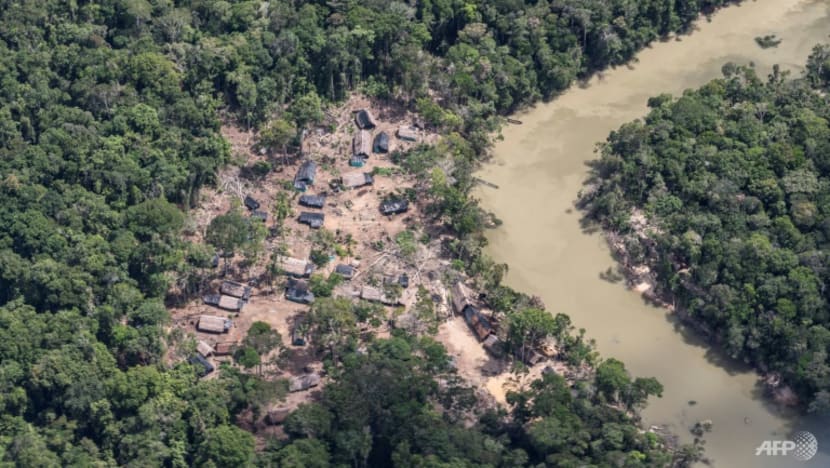Issued on: 10/09/2023
Palamas Karditsa (Greece) (AFP) – The toll from flooding that has ravaged villages in central Greece has risen to 15 people dead, rescue workers said Sunday.

A satellite image taken Saturday shows the flooded Greek town of Koskinas
© Handout / Satellite image ©2023 Maxar Technologies/AFP
The body of a 42-year-old man was recovered at sea in the Pelion region by the coastguard.
Earlier in the day, three bodies, including a 65-year-old man and his 88-year-old mother, were found near the town of Karditsa, where rescue operations are continuing unabated.
Saturday's toll listed 11 fatalities from the devastating floods.
A total of 4,250 people were rescued and brought to safety on Saturday and into Sunday morning, the Greek fire service said in a statement.
The storm dubbed "Daniel" hit the coastal region of Magnesia on Monday and Tuesday, in particular its capital, the port city of Volos and the villages around Mount Pelion, before hitting localities around Karditsa and Trikala further inland on Wednesday.
Experts have described the event as "extreme in terms of the amount of water falling in a space of 24 hours".
The heavy rains and flooding follow devastating fires in Greece this summer that killed at least 26 people.
The flooding has laid waste to thousands of hectares of rich agricultural land and farmers have also lost substantial livestock numbers.
Two people remain listed as missing in the floods.
The body of a 42-year-old man was recovered at sea in the Pelion region by the coastguard.
Earlier in the day, three bodies, including a 65-year-old man and his 88-year-old mother, were found near the town of Karditsa, where rescue operations are continuing unabated.
Saturday's toll listed 11 fatalities from the devastating floods.
A total of 4,250 people were rescued and brought to safety on Saturday and into Sunday morning, the Greek fire service said in a statement.
The storm dubbed "Daniel" hit the coastal region of Magnesia on Monday and Tuesday, in particular its capital, the port city of Volos and the villages around Mount Pelion, before hitting localities around Karditsa and Trikala further inland on Wednesday.
Experts have described the event as "extreme in terms of the amount of water falling in a space of 24 hours".
The heavy rains and flooding follow devastating fires in Greece this summer that killed at least 26 people.
The flooding has laid waste to thousands of hectares of rich agricultural land and farmers have also lost substantial livestock numbers.
Two people remain listed as missing in the floods.

A woman looks out from her house in the flooded city of Larissa
© STRINGER / AFP
In the port city of Volos, the water supply has become a problem, since pumping stations and a large part of the supply network were damaged. The health ministry has warned that the water is not suitable for drinking and there are reports of gastroenteritis emerging.
The entire Pelion peninsula region is still affected by power and water cuts, while main roads have been damaged by the torrential rain.
The situation also remains worrying near the city of Larissa, where the Pinios river has overflowed its banks and water is rising dangerously on the outskirts of the town.
Described by experts as an "extreme phenomenon" in terms of the amount of water that has fallen, falling", the storm hit Magnesia on Monday and Tuesday, in particular its capital, Volos and villages around Mount Pelion, before hitting localities around Karditsa and Trikala on Wednesday.
As the world warms, the atmosphere contains more water vapour which increases the risk of heavy precipitation in some parts of the world, notably in Asia, Western Europe and Latin America.
Combined with other factors such as urbanisation and land-use planning, these more intense rainfall events contribute to flooding.
Severe flooding in neighbouring Turkey and Bulgaria this week left 12 people dead.
© 2023 AFP
In the port city of Volos, the water supply has become a problem, since pumping stations and a large part of the supply network were damaged. The health ministry has warned that the water is not suitable for drinking and there are reports of gastroenteritis emerging.
The entire Pelion peninsula region is still affected by power and water cuts, while main roads have been damaged by the torrential rain.
The situation also remains worrying near the city of Larissa, where the Pinios river has overflowed its banks and water is rising dangerously on the outskirts of the town.
Described by experts as an "extreme phenomenon" in terms of the amount of water that has fallen, falling", the storm hit Magnesia on Monday and Tuesday, in particular its capital, Volos and villages around Mount Pelion, before hitting localities around Karditsa and Trikala on Wednesday.
As the world warms, the atmosphere contains more water vapour which increases the risk of heavy precipitation in some parts of the world, notably in Asia, Western Europe and Latin America.
Combined with other factors such as urbanisation and land-use planning, these more intense rainfall events contribute to flooding.
Severe flooding in neighbouring Turkey and Bulgaria this week left 12 people dead.
© 2023 AFP














